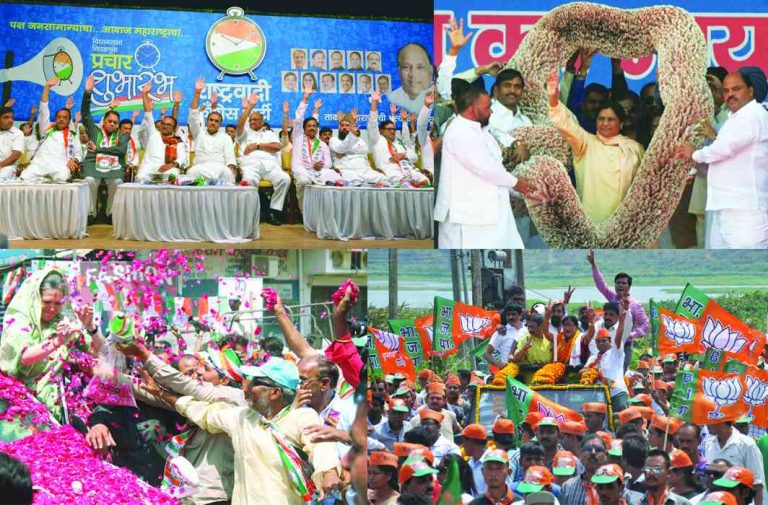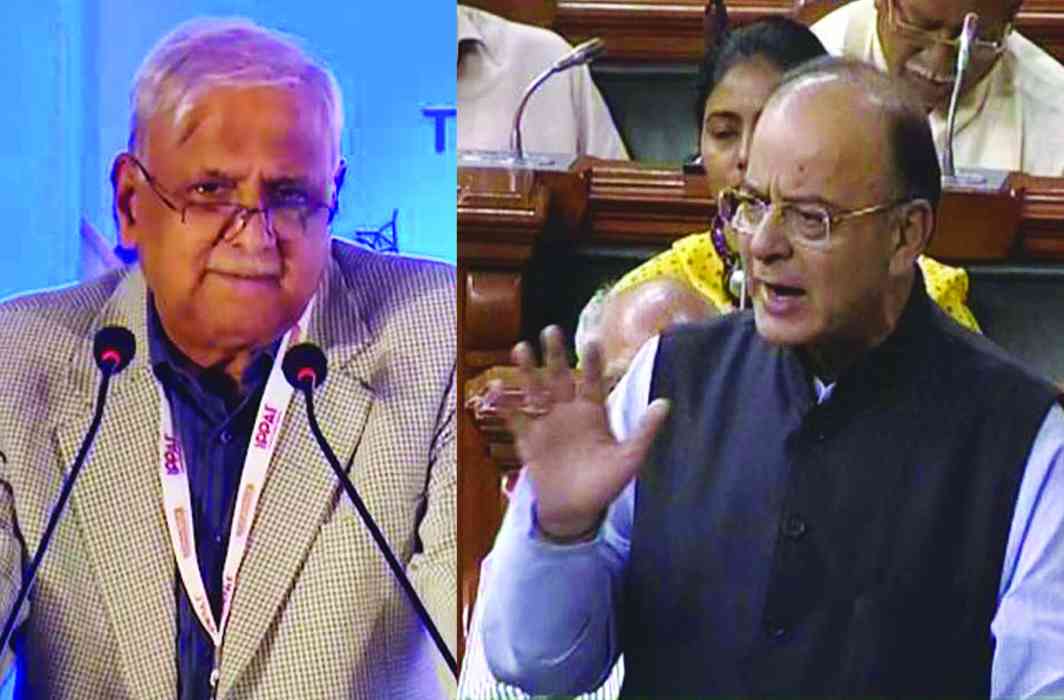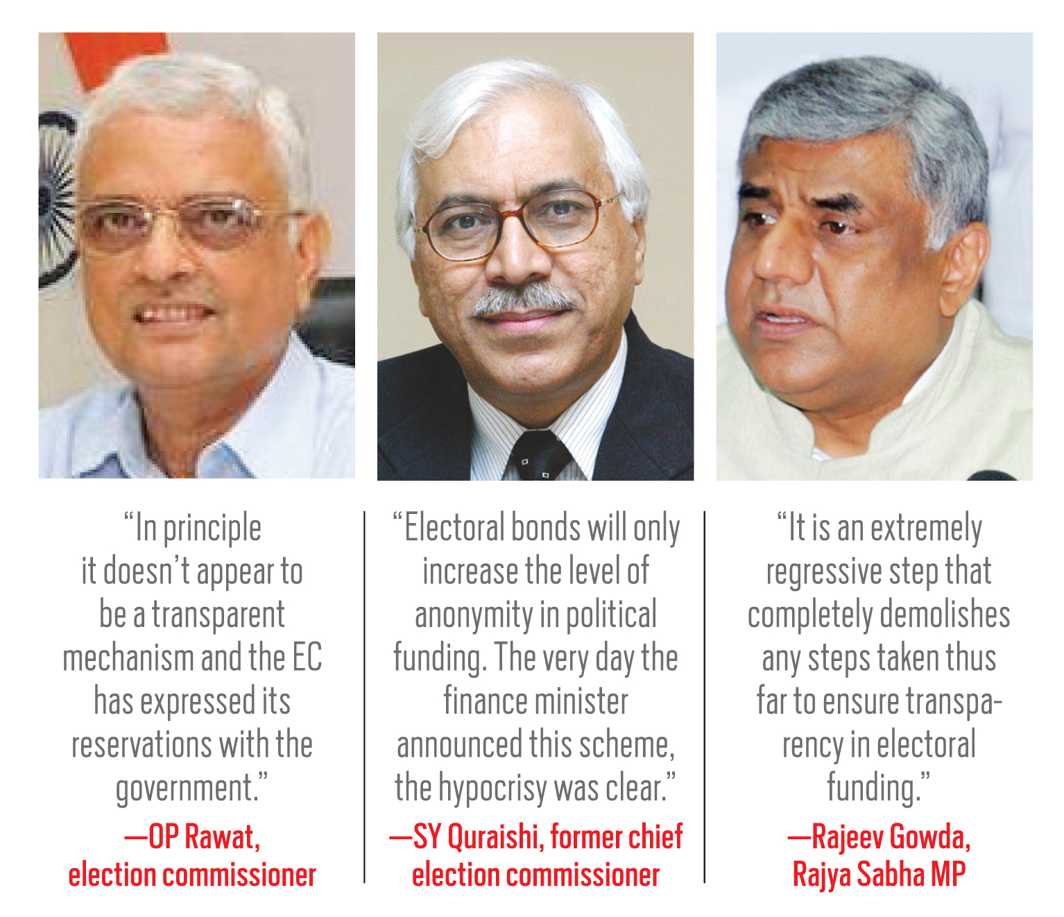
ABove: Satya Electoral Trust and the General Electoral Trust are among the biggest contributors of funds to political parties. No information about their contributors is available. Photo: UNI
An upcoming PIL challenges the manner in which electoral funding for political parties is becoming increasingly opaque
~By Puneet Nicholas Yadav
Sometime within the next fortnight a public interest litigation (PIL) challenging Union finance minister Arun Jaitley’s proposal for introducing bearer electoral bonds to enable electoral funding of political parties is to be filed in the Supreme Court. Among other things, the PIL will seek quashing of the electoral bond proposal and also the manner in which the Narendra Modi government, during this year’s budget session of Parliament, got controversial amendments on laws governing electoral funding passed as part of a Money Bill. The PIL, to be filed by Jagdeep Chhokar, former professor and director in-charge of the Indian Institute of Management, Ahmedabad, is certain to revive the debate on how political parties of all hues in India receive funds through opaque, often questionable means.
Recently, a report released by the Association of Democratic Reforms (ADR), of which Professor Chhokar is a founder member, had shown how five key national political parties—the Bharatiya Janata Party, Indian National Congress, Nationalist Congress Party, Communist Party of India and Communist Party of India-Marxist—had received a total of Rs 1,070.68 crore in voluntary donations above Rs 20,000 between financial years 2012-2013 and 2015-2016. A staggering 89 per cent of these donations, amounting to Rs 956.77 crore were received from corporate houses and Electoral Trusts. The BJP had received Rs 705.81 crore in the four years that were analysed by the ADR. The Congress which led the United Progressive Alliance (UPA) government at the Centre for two of these financial years—2012-2013 and 2013-2014—had received Rs 198.16 crore. The NCP, CPM and CPI had received Rs 50.73 crore, Rs 1. 89 crore and Rs 18 lakh respectively in corporate donations during this period.

While Chhokar’s PIL is set to seek complete transparency in the manner in which political parties receive crores of rupees in donations every year, measures taken in the past by successive central governments to make electoral funding transparent, ironically appear more as tools that brought in greater opacity. Finance minister Jaitley, arguably was the most successful of all his predecessors in introducing a uniquely ‘opaque’ transparent mechanism of electoral funding. During his budget speech this year, Jaitley had announced reducing the limit on voluntary cash donations that do not need to be declared by the parties from Rs 20,000 to Rs 2,000 and introduction of electoral bonds. Then, later in the same budget session, Jaitley proceeded to demolish the edifice of transparency that he had sought to build. Amendments which allowed corporates to make anonymous donations to political parties and lifted the earlier condition that corporate entities could only contribute 7.5 percent of their average net profit of past three years to parties were passed by Parliament as part of a Money Bill, preventing any possibility of them being struck down.
The PIL to be filed by Jagdeep Chhokar is certain to revive the debate on how political parties in India receive funds through opaque and questionable means.
Jaitley’s move to include matters related to funding of political parties and those that fell under the purview of the Representation of the People Act and Companies Act as amendments in a Money Bill itself was a departure from established convention. Professor Chhokar terms it “blatantly illegal”. Though the policy on how electoral bonds will function is yet to be drafted, Jaitley’s explanation on what the bonds would be like has itself raised questions on their efficacy in making electoral funding transparent. “A notified bank will be issuing electoral bonds. Any donor can buy those bonds using cheque or digital money. These bonds can be given to the political party. Every recognised political party will have to notify one bank account in advance to the Election Commission and these can be redeemed in only that account in a very short time. These bonds will be bearer in character to keep the donor anonymous,” Jaitley had clarified after presenting the budget.
Former chief election commissioner (CEC) SY Quraishi and Nasim Zaidi, who was about to retire as the CEC when the budget was presented, both expressed strong reservations. “Electoral bonds will only increase the level of anonymity in political funding. The very day the finance minister announced this scheme, the hypocrisy was clear. Hopes were raised that major steps would be taken to increase transparency and then anonymity was retained through the electoral bond. This is a deliberate, mischievous and dangerous move,” Quraishi said. Zaidi, who as CEC was apparently not consulted by the government over the plan, said: “There is clearly no transparency. Some people’s concern may be to give anonymity to big donors but we are here to work for the people. They want to know who has contributed to whom and how much amount—this should be disclosed.”
The Election Commission has also written to the law ministry asking it to review the exemption for the electoral bond scheme from Section 29 C of the RP Act. The section mandates full disclosure of amounts received by a political party and the expenditure incurred. Election Commissioner OP Rawat, who was recently in the news for asserting that the need among political parties to win elections “at any cost… without ethics” was the “new normal” in Indian politics, too expressed caution over electoral bonds. “The final rules on it are yet to come out but in principle it doesn’t appear to be a transparent mechanism and the EC has expressed its reservations with the government,” Rawat said.
Quraishi believes that the electoral bond will give a huge advantage to any ruling party over the opposition and possibly lead to “arm-twisting of corporates”. “From what is known so far, only the government through its finance ministry will know which corporate has bought an electoral bond and for what amount because the bank will inform the RBI or the ministry. If the ruling party knows about a corporate buying an electoral bond, it will be easy for it to pressure the corporate entity to contribute the money to its coffers,” Quraishi said. The Opposition clearly isn’t happy either. “It is an extremely regressive step that completely demolishes any steps taken thus far to ensure transparency in electoral funding,” says Congress spokesperson and Rajya Sabha MP, Rajeev Gowda.
But have earlier mechanisms to ensure transparency in electoral funding proved efficient? The ADR report shows two Electoral Trusts, namely the Satya Electoral Trust and the General Electoral Trust, being among the biggest contributors of funds to political parties. The Satya Electoral Trust was the largest donor to political parties, donating a total of Rs 260.87 crore—Rs 193.62 crore to the BJP, Rs 57.25 crore and Rs 10 crore to the Congress and NCP respectively—between FY 2013-2014 and 2015-2016. The General Electoral Trust came second, having contributed a total of Rs 124.8 crore to the BJP (Rs 70.70 crore) and the Congress (Rs 54.10 crore). The UPA government had in January 2013 amended the Income Tax Rules, 1962 to insert Rule 17 CA to list the functions of Electoral Trusts which are approved by the Central Bureau of Direct Taxes (CBDT). Under the rules, the approval for setting up the Trust may be given for one year or 3 years at a stretch by the CBDT and can be withdrawn “if the CBDT is satisfied that the Electoral Trust ceased to exist, or is not genuine or has not complied with the specified conditions. CBDT is empowered to call for information from the electoral trust”.
Any corporate, or even individual, could simply donate money to the Trust, which would then make contributions to parties without telling them which corporate had provided the fund. However, Trusts which were set up before the Electoral Scheme was formulated, argued that the new rules didn’t apply retrospectively and so did not make it mandatory for them to make any disclosures with the EC and CBDT. The General Electoral Trust which was set up sometime in 1998 possibly by the Aditya Birla Group, though surprisingly no official record of this is present with the EC or the CBDT, appears to be one such Trust. “We have filed several RTIs with the EC, CBDT and the Income tax department’s Trust division in Mumbai seeking information of Electoral Trusts that were formed before the Electoral Scheme of 2013, their audit reports and details of contributions to political parties but we were informed that these details are not available,” said Chhokar.
Interestingly, while several spokespersons of the BJP that India Legal spoke to about the donations received from the General Electoral Trust and other such entities declined to comment, Congress spokesperson Rajeev Gowda too said that he was “not conversant with the rules governing Electoral Trusts and did not know much about the General Electoral Trust”. The General Electoral Trust, which has in fact been pumping crores of rupees every year into the Congress and BJP since 2004, appears to be a ghost entity —names of its trustees are not known and neither is any information about its contributors available. Even the EC, which is supposed to have a record of all Electoral Trusts, seems to be clueless about the General Electoral Trust. Asked why the EC had not summoned any information from a Trust whose income and contributions were suspect, Election Commissioner OP Rawat, “I can’t recall whether we have taken any action against the General Electoral Trust but we should have some record of their audit report if they are a recognised trust”.
Arun Jaitley’s explanation on what the electoral bonds would be like has already raised questions on their efficacy in making electoral funding transparent.
Under the rules governing electoral funding, political parties cannot receive any funds from foreign entities. However, as Chhokar points out: “If an Electoral Trust claims that it pre-existed the Electoral Scheme and so is not governed under its rules, it is easy for it to receive foreign funds and pass them on to political parties. This, I suspect, is the case with the General Electoral Trust too”. Chhokar cited an example of a case he had filed in the Delhi High Court against the Political and Public Awareness Trust which had been receiving funds from Indian subsidiaries of Vedanta, a company registered in the United Kingdom, and passing them on to the BJP and Congress. “These funds were funnelled to the two parties before 2009 when amendments that allowed funding through Indian subsidiaries of foreign entities were not made to the Foreign Contribution (Regulation) Act. The Delhi High Court held the BJP and Congress guilty of accepting foreign funding. The parties went into appeal in the Supreme Court but later withdrew their appeals,” Chhokar said. However, despite being guilty of a crime, no action has expectedly been taken against the BJP or the Congress for getting money from an overseas source, and Chhokar has now moved a contempt of court plea against the two parties in the Delhi High Court.
But the mysterious dealings of Electoral Trusts and controversies over the electoral bond aside, what happens when a political party like Mayawati’s Bahujan Samaj Party (BSP) tells the EC that it has nothing to declare in terms of contributions received by it because all its donations were in cash and of amounts lower than Rs 20,000? “Simple, nothing can be done about it,” says Quraishi. He has made a radical recommendation on making electoral funding transparent: “The ideal solution would be to set up a National Electoral Fund to which all donors can openly contribute without expressing any preference for any political party. The funds could then be allocated to all registered political parties after an election is held in proportion to the votes obtained by them—say Rs 100 per vote won. This will also address the donors’ concern for secrecy”.
It now remains to be seen whether Chhokar’s PIL paves the way for a Supreme Court order that could act as a game changer for transparency in electoral funding, or whether the government finds a way around it to protect interests of political parties as it usually does.

